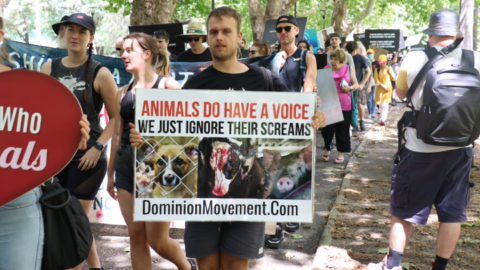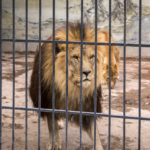Sydney Animal Liberationists Call on Government to End Lawful Systemic Abuses
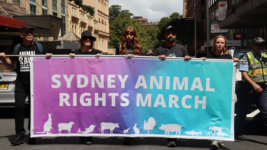
Sydney’s Belmore Park was awash with animal rights activists last Saturday, 4 March, as they gathered, just weeks before the NSW state election, for the Sydney Animal Rights March to protest against the systemic abuse of animals under Australian law.
The Coalition government has been enacting laws to stamp out protest over the last decade. Many of these have specifically targeted climate and environmental defenders, yet it’s less known that the ability of animal rights activists to take nonviolent direct action has also been cracked down upon.
Another hidden truth is that the consumption of animals contributes to about 14.5 percent of the greenhouse gas emissions that are spurring the climate crisis, which means that animal agriculture contributes more to extreme weather events than does global transportation.
Of course, the crowd of animal liberationists and vegans were also calling on our society to stop the ongoing exploitation of billions of animals, which includes being forced to race, live in cages, having offspring removed, fur ripped out and living a confined and torturous life prior to being killed early.
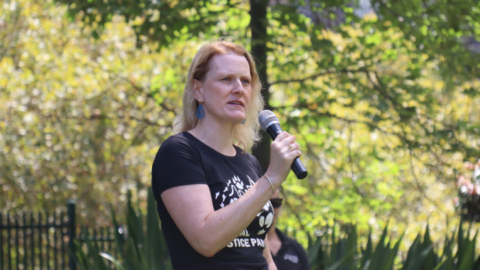
Stop the abuse
“The Animal Justice Party highlights important issues that affect animals,” said Alison Waters, the lead upper house candidate on the Animal Justice Party ticket. “The other parties aren’t concerned with this, and mainly only talk about these issues during elections.”
“The AJP has secured millions of dollars for animal protection. This is ground breaking,” she continued and further pointed out that her colleague, AJP MLC Emma Hurst, has tabled more private members bills over the last term of state parliament than any other member.
Hurst was elected in March 2019, and, over that time, she’s ensured penalties for animal abuse have increased, established bans on ownership for serious abusers, outlawed convenience killings at pounds and she’s seen the link between animal abuse and domestic violence officially recognised.
While over the next parliament, the AJP will further be prioritising saving the habitat of the near extinct koala, establishing Veticare, ending live animal exports, bringing forward the date that the prohibition on battery hen cages takes effect, as well as banning puppy farms.
“The incoming government needs to know that the people of NSW care about the wellbeing and protection of animals,” Waters explained. “A number one vote for the Animal Justice Party sends that really clear message. It’s unambiguous.”
“We all need to show up and vote for animals this election. If not us, then who?”
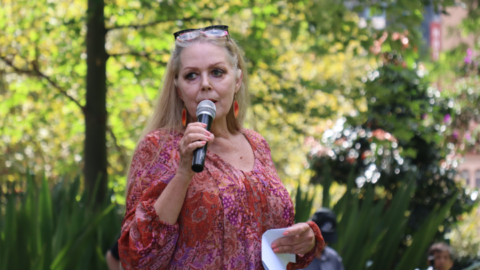
The ongoing battle
Legendary Australian television star Lynda Stoner has been one of the most prominent animal rights activists in this country. She told the Sydney rally that she had an epiphany after reading Peter Singer’s 1975 book Animal Liberation, which spurred her into action.
“I thought once I make this information available to everybody, then everybody would change, and I couldn’t have been more wrong,” said Stoner.
“One of the first things I did was stand in a Melbourne market handing out flyers about egg-laying chickens in squalid factory conditions. And I thought, this will take a couple of years, and this will be banned. But in 2023, we are still trying to get them banned.”
Indeed, as the calls for animal liberation have grown louder over the decades since, governments have been increasing the laws that prevent activists taking action.
In this state, the passing of both the Biosecurity Act 2015 (NSW) and The Right to Farm Act 2019 (NSW) established such laws.
One of the most draconian ag-gag laws on the NSW books is section 4B of the Inclosed Lands Protection Act 1901 (NSW), which, after a 2019 amendment, sees animal activists found trespassing on agricultural land facing up to 12 months inside, or 3 years if in company.
“Back in the day we could do sit-ins in piggeries… and you would get a slap on the wrist and that was it,” Stoner recalled. “But as a mark of how powerful this movement has become, more and more onerous laws against us have come in: ag-gag laws, gaol time and fines for organisations.”
“Rather than see this as a negative, it is a positive, because they wouldn’t be doing that if we weren’t being effective,” she said in conclusion. “The public knows and there is no turning back. Social media has guaranteed this information isn’t blocked.”
